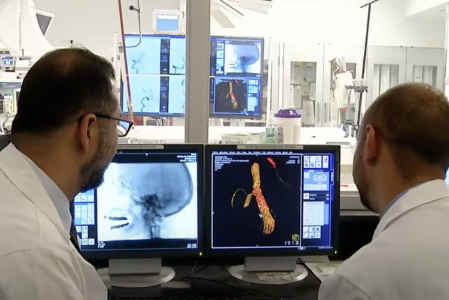Always feeling tired? Doctors say a "mini-stroke" you never noticed could be the reason
By
Veronica E.
- Replies 0
Disclaimer: The information provided in this article is for educational purposes only and is not intended as a substitute for professional medical advice, diagnosis, or treatment. Always consult your physician or other qualified healthcare providers with any questions you may have regarding a medical condition or before making any changes to your health regimen.
We all have days when we feel drained—whether it’s after a poor night’s sleep, a busy stretch, or just part of getting older.
But what if your constant fatigue isn’t just a part of aging?
What if it’s your body trying to tell you something important—like a mini-stroke you didn’t even know happened?
At The GrayVine, we know how frustrating it can be to feel tired all the time without a clear reason.
That’s why we’re sharing what doctors are discovering about “silent” mini-strokes, also known as transient ischemic attacks (TIAs), and how they could be quietly affecting your energy, memory, and overall health.
Understanding the signs now could make all the difference later.

What is a mini-stroke, and why is it hard to spot?
A mini-stroke (TIA) happens when the brain’s blood supply is briefly interrupted.
Unlike a major stroke, the blockage clears up quickly—usually within 24 hours—and symptoms often disappear on their own.
But that doesn’t mean they’re harmless.
In fact, experts say TIAs are a serious warning sign that a bigger stroke could be coming.
The tricky part? Most people don’t even realize they’ve had one.
Many describe feeling “off,” maybe a bit dizzy, blurry-eyed, or momentarily weak.
These symptoms can come and go in minutes—making it easy to ignore.
Also read: 8 everyday habits that could help you avoid a stroke, according to a nurse
The surprising connection between TIAs and lasting fatigue
A recent study out of Denmark, published in Neurology, followed 354 adults (average age 70) who experienced a TIA.
More than 60% said they felt unusually fatigued just two weeks after the event.
Even more surprising? About half of them were still tired three months—and even a full year—later.
Why the lasting fatigue? Even short disruptions in brain blood flow can leave the brain working overtime to recover.
This strain may show up as mental fog, physical weakness, and general exhaustion.
The same study also found that those with anxiety or depression were twice as likely to feel long-term fatigue after a TIA.
Also read: Could your eyes reveal stroke risk? Find out now
How to recognize fatigue linked to a mini-stroke
Fatigue from a TIA isn’t just feeling sleepy.
It’s a persistent kind of tiredness that rest doesn’t fix.
Here are some common signs:
Physical fatigue
Mental fatigue
Some also notice mood swings or disrupted sleep patterns, which can make fatigue even worse.
Why TIAs often go unnoticed
Mini-strokes are sometimes called “silent” for a reason—the signs are subtle, and they pass quickly.
But even a few fleeting minutes of the following symptoms can signal a TIA:
If you or someone you know experiences these signs, even for just a few minutes, it’s important to call a doctor or visit the ER.
A TIA is a warning sign—don’t wait for something worse.
Also read: A simple change that could lower your stroke risk by 14%—here’s what researchers found!
Feeling tired all the time? Here’s what to do
If you’re battling unexplained fatigue, especially if you have high blood pressure, diabetes, or heart disease, don’t ignore it.
Talk to your healthcare provider about your symptoms—they may recommend tests to check for past TIAs or other conditions.
Here are some ways to take charge of your energy and brain health:
If you notice changes in your energy, memory, or physical abilities—even small ones—don’t brush it off.
Fatigue could be your body’s way of asking for help.
TIAs might not make a big splash, but their effects can linger, especially if untreated.
Read next: Drinking THIS can skyrocket your stroke risk by 22% –The bubbly truth revealed by scientists!

Have you or someone close to you experienced a mini-stroke or struggled with long-term tiredness? What helped you recover? We’d love to hear your story. Your experience could help someone else recognize the signs—and possibly prevent a major stroke down the line. Share your thoughts in the comments.
We all have days when we feel drained—whether it’s after a poor night’s sleep, a busy stretch, or just part of getting older.
But what if your constant fatigue isn’t just a part of aging?
What if it’s your body trying to tell you something important—like a mini-stroke you didn’t even know happened?
At The GrayVine, we know how frustrating it can be to feel tired all the time without a clear reason.
That’s why we’re sharing what doctors are discovering about “silent” mini-strokes, also known as transient ischemic attacks (TIAs), and how they could be quietly affecting your energy, memory, and overall health.
Understanding the signs now could make all the difference later.

Fatigue can be more than just feeling tired—doctors say it could be a sign of something more serious. Image Source: YouTube / CNN
A mini-stroke (TIA) happens when the brain’s blood supply is briefly interrupted.
Unlike a major stroke, the blockage clears up quickly—usually within 24 hours—and symptoms often disappear on their own.
But that doesn’t mean they’re harmless.
In fact, experts say TIAs are a serious warning sign that a bigger stroke could be coming.
The tricky part? Most people don’t even realize they’ve had one.
Many describe feeling “off,” maybe a bit dizzy, blurry-eyed, or momentarily weak.
These symptoms can come and go in minutes—making it easy to ignore.
Also read: 8 everyday habits that could help you avoid a stroke, according to a nurse
The surprising connection between TIAs and lasting fatigue
A recent study out of Denmark, published in Neurology, followed 354 adults (average age 70) who experienced a TIA.
More than 60% said they felt unusually fatigued just two weeks after the event.
Even more surprising? About half of them were still tired three months—and even a full year—later.
Why the lasting fatigue? Even short disruptions in brain blood flow can leave the brain working overtime to recover.
This strain may show up as mental fog, physical weakness, and general exhaustion.
The same study also found that those with anxiety or depression were twice as likely to feel long-term fatigue after a TIA.
Also read: Could your eyes reveal stroke risk? Find out now
How to recognize fatigue linked to a mini-stroke
Fatigue from a TIA isn’t just feeling sleepy.
It’s a persistent kind of tiredness that rest doesn’t fix.
Here are some common signs:
Physical fatigue
- Muscle weakness or heaviness
- Body aches or headaches
- Digestive changes
Mental fatigue
- Trouble focusing
- Slowed thinking
- Difficulty making decisions
- Memory issues
Some also notice mood swings or disrupted sleep patterns, which can make fatigue even worse.
Why TIAs often go unnoticed
Mini-strokes are sometimes called “silent” for a reason—the signs are subtle, and they pass quickly.
But even a few fleeting minutes of the following symptoms can signal a TIA:
- Numbness or weakness in the face, arm, or leg—often on one side
- Trouble speaking or confusion
- Sudden blurred or double vision
- Dizziness or loss of balance
- Intense headache with no clear cause
If you or someone you know experiences these signs, even for just a few minutes, it’s important to call a doctor or visit the ER.
A TIA is a warning sign—don’t wait for something worse.
Also read: A simple change that could lower your stroke risk by 14%—here’s what researchers found!
Feeling tired all the time? Here’s what to do
If you’re battling unexplained fatigue, especially if you have high blood pressure, diabetes, or heart disease, don’t ignore it.
Talk to your healthcare provider about your symptoms—they may recommend tests to check for past TIAs or other conditions.
Here are some ways to take charge of your energy and brain health:
- Know your numbers: Keep blood pressure, blood sugar, and cholesterol under control.
- Stay active: Daily movement helps circulation and brain health.
- Eat smart: A heart-friendly diet also supports brain function.
- Avoid smoking: Smoking narrows blood vessels and increases stroke risk.
- Reduce stress: Chronic stress can wear you down and affect your brain.
- Get regular checkups: Early detection is one of the best ways to stay ahead of health issues.
If you notice changes in your energy, memory, or physical abilities—even small ones—don’t brush it off.
Fatigue could be your body’s way of asking for help.
TIAs might not make a big splash, but their effects can linger, especially if untreated.
Read next: Drinking THIS can skyrocket your stroke risk by 22% –The bubbly truth revealed by scientists!
Key Takeaways
- Persistent fatigue or exhaustion could be linked to a “silent” mini-stroke, also known as a transient ischemic attack (TIA), that often goes unnoticed.
- A Danish study found that long-term fatigue is common after a TIA, with over half of patients still reporting symptoms up to a year later.
- People with a history of anxiety or depression are twice as likely to experience lasting fatigue following a TIA.
- Experts recommend ongoing monitoring for fatigue in patients who’ve had a TIA, as it could signal the need for additional care and support.
Have you or someone close to you experienced a mini-stroke or struggled with long-term tiredness? What helped you recover? We’d love to hear your story. Your experience could help someone else recognize the signs—and possibly prevent a major stroke down the line. Share your thoughts in the comments.






